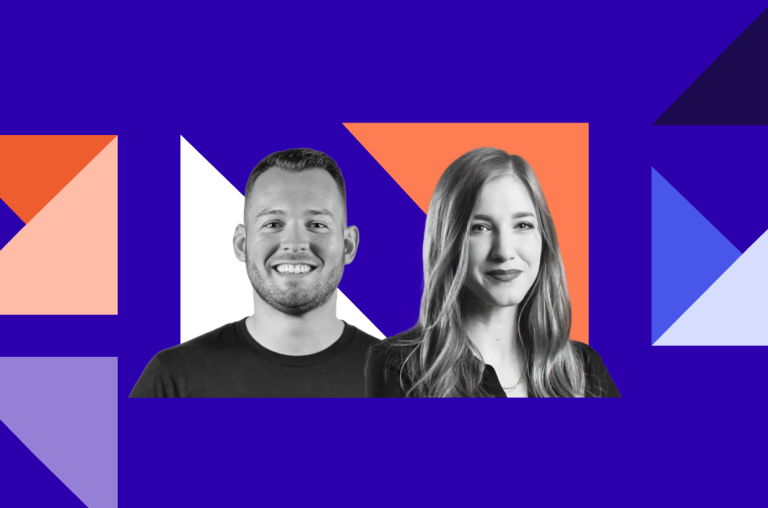Bold Session Recap – Using AI – Not Getting Used by AI

Recently we held a live Q&A session on how agencies are using AI to their benefit with Nicholas Petroski, Founder at Promethean Research as our guest.
During the session, he revealed a handful of takeaways from his latest report, “Digital Agencies & AI”.
Promethean Research is a boutique consultancy with a mission to revolutionize the growth journey of digital agencies. Nicholas has been at the forefront of guiding digital firms since 2015. His expertise extends from helping agencies understand their industry intricacies to charting strategic paths for success.
Below, a recap of the session.
What would you say the most interesting findings were from your research into agencies’ use of AI?
I think one of the biggest things was that there’s a big difference between how high-performing agency leaders see AI and their expectations from AI.
They’re much more positive about it. They came out of the gate and they were like, “This is amazing, this stuff’s going to change our business for the better, and we’re going to get on top this and we’re going to do something cool with it.” Those agencies are the ones with that are growing faster. They have higher margins, lower turnover and are already doing really well.
Then on the other side, you have the agencies that aren’t doing so well. They’re growing slower than average, they aren’t making as much money, and they’re much more pessimistic about it. They see this as a threat. To them it’s another challenge that needs to be incorporated into running an agency business. So it’s fair to say that it scares them a bit.
If agencies figure out how to successfully implement AI into their work, the productivity gains are going to be worth the trouble. This should be looked at as an opportunity because if you do it right, it can help you close the gap with where the highest performing agencies are.
What are the most commonly used AI tools and their use cases in agencies? Are the productivity improvements already showing or has optimizing just begun?
So, overall, I’d say agencies are still in the early stages of implementing a lot of the AI tools and there is a lot of experimenting going on. Everyone is trying to figure out what the best use cases are for AI tools – for now the “best” productivity has been achieved in terms of copywriting and coding. I want to give a bit more clarity on this, so the tools that are used for copywriting and coding have been showing improvements productivity wise. That’s because their implementation is further along than some other tools.
Tools that have been out on the market for years have a higher value return – tools like Jasper, GitHub Copilot or ChatGPT. They’re easy to use and people really jumped on the opportunity to test them out and implement them into their processes. Tools that are used for video production are in early stages of adoption and aren’t providing significant value to agencies – yet. Once the tools develop more, we’re going to start seeing that the maturity and implementation levels in agencies catch up with one another.
So the big question now is: are agencies seeing any productivity improvements or are the tools just costing them money for now? Well, around 40-50% of agencies saw productivity gains. When asked to quantify the gains, most of the agencies fell into the 0-24% productivity improvement. All of the agencies have different aspects of value delivery, they’re in the really early stages of implementing the tools and are already seeing return on their investments in terms of better productivity which is pretty significant. Getting into the experimentation phase now and figuring things out will help you in the long run.
A lot of people said that they perceived themselves as being below average in their understanding of AI’s potential. Why do you think this is? What about employee education in AI?
Yeah, everybody feels like they’re behind the curve. It’s partially due to the overload of information, everyone is trying to be updated on AI development which, in turn, creates so much noise that it’s hard to figure out what’s important news and what’s not. Since we said that these are the early adoption phases, it’s extremely important to build a solid noise filter and sift through the information so you’re getting what you need.
Another important thing is employee education. Most of the agency owners told me that while they felt they’re behind the curve, they still felt like they were ahead of their employees in terms of AI knowledge. This means that their employees are extra behind the curve. So the logical outcome of this would be implementing some sort of education programme, right?
Only about 20% of the agencies had some kind structured AI education for their employees. So only a fifth of agencies are building any kind of structure to bridge this massive gap in knowledge. It’s crucial to get your people to experiment with the tools since they’re the ones that are doing the daily value delivery stuff because they know their processes, where the weak points are and where AI can be helpful.
What are the main areas of gain agencies have seen so far and how does that translate into profit margins?
I was recently at a conference and I spoke with an agency owner about how AI impacted their work. He said that his team is able to push out podcasts 5 to 10 times faster than they could previously. Now he runs a reputable agency, not just some hole in the wall, and they’ve been able to massively increase their output without having to hire more people.
If we look at the average profit margins, for digital agencies, they were around 14% last year. So how does the 20-30% increase in productivity translate into profit margins? Since these are the early stages, there isn’t a lot of efficiency in this, but even at this stage we’re seeing two to three times net income margins, and that can’t be ignored.
What do you think the next big thing with AI would be in an agency environment?
Since all agencies do different things, the value they deliver to their clients is also different. This means that being able to quickly figure out and implement these tools is crucial. Systematizing those improvements, whether it’s something like increase in production without having to hire or anything else that might pop up, is going to be big for agencies.
In terms of untapped potential, I think a lot of it lies in product management, finance, accounting, marketing, as well as some pieces of RevGen, sales and BizDev. There’s a ton of opportunity there, but it’s not explored yet because it’s so new.
We’re also seeing some interesting things revolving around sales, specifically the use of transcriptions from sales meetings to generate multi level prompts that will identify buying intent and how close the prospect is to being ready to make a purchase decision. There’s talk about tools that are able to analyze body language, amount of time that people are talking, the sentiment analysis on the types of words that they use, all of that.
There’s a lot coming our way and it’s going to be pretty exciting.
A lot of people have their reservations about AI, mainly about the impact it’s going to have on creative jobs. What would you say about that?
So will it take a creative’s job? Maybe, maybe not. I don’t know how many creatives lost their job when they went from graphic design and paper and pencil to Adobe in the 90’s. We’re probably going to see a bit of a slowdown in hiring because you do get massive productivity gains from AI without the need to hire new people.
The best thing is to look at the tools as an opportunity rather than a threat, it’s a skill that you’re going to have to acquire at some point, so why not do it now? It’s a great time to experiment and dig out new tools, I’ve seen creatives do some amazing stuff with AI.
There’s been some concerns about originality and legality of content usage that’s produced by these tools. What are you thoughts on that?
Yeah, there’s a lot of concern around the the ownership of creative output, especially when you’re working for larger clients where the product is going to be seen by millions. These kinds of things could open clients and agencies to a lot of legal challenges.
I’ve heard some talk from various attorneys talking about how there’s no real precedent set for this yet. There’s some stuff going through, or at least there was stuff going through the courts. I don’t know if it’s gone through yet, so we’ll have to wait and see.
Connect With Agency Peers
Access agency-related Slack channels, exchange business insights, and join in on members-only live sessions.




